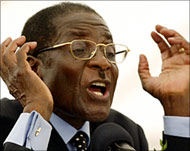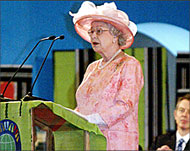Commonwealth split over Zimbabwe
Commonwealth leaders have tried to sidestep the issue of Zimbabwe’s suspension but the row between African states and the so-called “white Commonwealth” has overshadowed their summit’s first day.

Summit host President Olusegun Obasanjo of Nigeria on Friday proposed setting up an ad hoc committee to discuss the issue as Zimbabwe’s isolated leader Robert Mugabe threatened again to quit the international body.
New Zealand’s prime minister, Helen Clark, said there was no mood among Commonwealth members to lift the suspension. But she said differences remained over what conditions President Robert Mugabe’s regime needs to fulfil before Zimbabwe is readmitted.
Asked about the possibility of Zimbabwe’s readmittance during the meeting of the 54-nation Commonwealth, Clark told reporters: “I don’t think there’s any question of that.”
Observers at the summit’s first executive session said British Prime Minister Tony Blair, one of the harshest critics of Mugabe, had left the meeting early and appeared upset.
Zimbabwean woes
Zimbabwe, mired in deep political and economic woes and threatened with famine, was suspended from the Commonwealth in March last year after Mugabe was re-elected in a poll marred by violence and fraud.
 |
|
President Mugabe says Zimbabwe |
Several African nations – including South Africa and Mozambique – have lobbied publicly for Zimbabwe to be allowed to return to the fold.
But this is strongly opposed by the so-called “white Commonwealth” of Britain, Australia and New Zealand.
Obasanjo, keen to prevent the row from overshadowing the rest of the summit agenda, proposed that representatives from six nations – Australia, Canada, India, Jamaica, Mozambique and South Africa – meet separately from the main council to draw up a report on the issue.
Pakistani progress
Lower level ministers have prepared a report on the suspension of both Zimbabwe and Pakistan for the meeting of 40 heads of state and government and 12 top-level national representatives.
 |
|
Elizabeth II addresses delegates |
Pakistan was suspended in October 1999 when General Pervez Musharraf seized power in a coup. He has since held parliamentary elections, however, and is seen as working slowly to restore elected rule.
The diplomatic wrangling overshadowed the formal opening of the summit by Queen Elizabeth II, on her first state visit to Nigeria since its independence in 1960. She is the official head of state of not only Britain but most members of the Commonwealth, including Australia, Canada, New Zealand and Jamaica.
“Eradicating poverty, fighting terror, bridging the digital divide and building a more peaceful world are some of the challenges this meeting will have to face,” she said.
The Commonwealth is a voluntary body with 54 members representing 1.8 billion people in countries as diverse as India and the tiny Pacific island of Tuvalu.